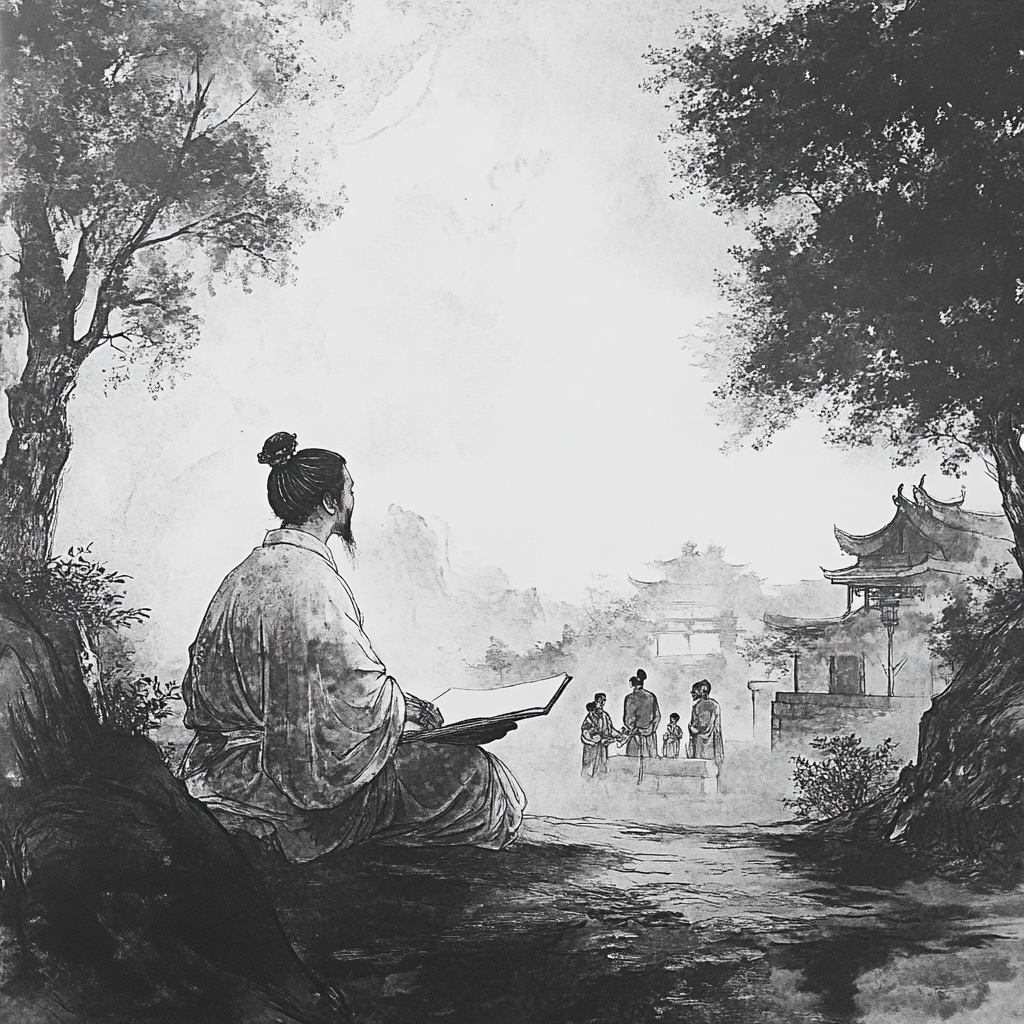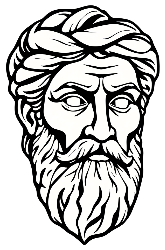Founder: Confucius (Kong Fuzi, 551–479 BCE)
Confucius, born during a time of political instability in the late Zhou Dynasty, sought to create A Guide to Ethical Living and Social Harmony, a system of thought emphasizing moral virtue and social order as the foundation of a stable and harmonious society. He believed that individuals could cultivate moral virtues through proper education, self-discipline, and respect for others, thus contributing to a more orderly and just society. His teachings were later compiled by his disciples into the Analects, a collection of his sayings and ideas, which forms the basis of Confucian thought.
Living in Harmony with the Tao
Key Texts of Confucianism
The foundational texts of Confucianism include:
- The Analects (Lunyu): A collection of sayings and ideas attributed to Confucius and his followers.
- Mencius: A text written by Mencius, a later Confucian philosopher who expanded on Confucius’s teachings, emphasizing the inherent goodness of human nature.
- Xunzi: Another important work written by Xunzi, a Confucian scholar who, in contrast to Mencius, believed that human nature is inherently selfish and requires strict guidance through education and ritual.
Core Ideas of Confucianism

1. Humaneness (Ren)
One of the central virtues in Confucianism is Ren (often translated as “humaneness” or “benevolence”). Ren represents the compassion and kindness one should have toward others, reflecting a deep concern for the well-being of society. Confucius believed that Ren is the foundation of ethical behavior and that only by cultivating this virtue can individuals contribute to the greater good.
- Ren is often described as the ability to empathize with others and act in ways that promote mutual respect and harmony. Confucius said, “What you do not wish for yourself, do not do to others”—a principle similar to the Golden Rule in other philosophical traditions.
2. Ritual (Li)
Li refers to the importance of rituals, customs, and proper behavior in Confucianism. However, Li is more than mere formalities—it encompasses proper conduct in all aspects of life, including family relationships, community interactions, and governance. Through Li, individuals demonstrate respect for tradition, authority, and societal norms, which helps maintain social harmony.
- Rituals are not limited to religious ceremonies but also include everyday actions such as showing respect for elders, performing duties as a citizen, and following social hierarchies.
3. Filial Piety (Xiao)
A key aspect of Confucian ethics is Xiao, or filial piety, which emphasizes respect for one’s parents and ancestors. In Confucian thought, family is the building block of society, and maintaining strong, respectful family relationships is crucial for social order. Xiao extends to loyalty and obedience to one’s superiors, whether in the family, workplace, or government.
- Confucius saw the family as a microcosm of society; just as harmony is maintained in the family through respect and proper roles, a well-ordered society is maintained when individuals follow their roles and respect authority.
4. Social Harmony
The ultimate goal of Confucianism is to achieve social harmony. Confucius believed that social order arises from individuals fulfilling their roles in society and interacting with others based on virtue. When people practice Ren (humaneness) and follow Li (ritual), society as a whole benefits from peace and stability.
- Confucianism advocates for a hierarchical society, where everyone has a defined role—whether as a ruler, subject, parent, or child—and adheres to the moral virtues appropriate for that role. However, this hierarchy is not oppressive; it is based on mutual respect and moral integrity.
5. The Role of the Gentleman (Junzi)
Confucius emphasized the ideal of the Junzi, or “gentleman”—a morally superior individual who leads by example. Unlike the Xiaoren (small person), who is driven by self-interest and base desires, the Junzi seeks to cultivate virtue, wisdom, and integrity.
- The Junzi is not born into nobility but becomes noble through moral cultivation. A Junzi adheres to Ren, practices Li, and upholds Xiao. Confucius believed that leaders, in particular, should strive to become Junzi, as moral leadership would inspire the populace to follow suit.
Confucianism’s Influence on Society
Confucianism’s influence on Chinese society, as A Guide to Ethical Living and Social Harmony, cannot be overstated. During the Han Dynasty (206 BCE–220 CE), Confucianism became the official state philosophy, and its principles shaped Chinese government, education, and family life for centuries. The Confucian civil service exam system, which selected government officials based on merit rather than birth, was rooted in Confucian ideals of education and moral leadership.
Confucianism also played a significant role in shaping family dynamics, with an emphasis on filial piety and respect for elders deeply embedded in Chinese culture. Its impact extended beyond China, influencing societies in Japan, Korea, and Vietnam, where Confucian principles of hierarchy, social order, and respect for authority became integral to governance and social norms.
Confucianism in the Modern World
Although Confucianism emerged over 2,000 years ago, A Guide to Ethical Living and Social Harmony, its teachings remain relevant today. In an increasingly globalized world, where ethical behavior and social harmony often conflict with personal ambition and individualism, Confucian values of Ren, Li, and Xiao offer timeless insights into living together harmoniously. The emphasis on compassion, respect, and moral leadership continues to inspire not only scholars of Eastern philosophy but also individuals striving for more just and humane societies.
Confucius’s vision of a world governed by virtue, where individuals lead by moral example and respect for others, provides a powerful blueprint for creating a more peaceful and balanced world.

